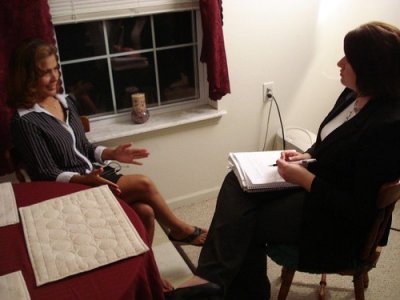Dating Someone with Aspergers – What Helps?
Started a relationship, only to discover you are dating someone with Aspergers?
Lead writer Andrea Blundell explores how to cope when your partner is on the autism spectrum.
1. Remember he or she is still an individual.
Nobody is their diagnosis. They are first and foremost an individual who happens to be diagnosed with autism spectrum disorder.
(Note that ‘Asperger’s syndrome‘ is an old diagnosis. Although it’s still in use, the official diagnosis is ASD).
Mental health diagnoses are simply terms created by mental health professionals to describe groups of people with the similar symptoms. In other words, a label, and a label can’t perfectly describe a person.
Autism is also called a ‘spectrum’ because there are so many variations in those who have it.
2. Educate yourself from BOTH sides.
Evidently you are already on this path as you are here reading this article, which is fantastic.
It’s also good to read things written by people with Aspergers, such as our case study, ““My Life With Aspergers”. They know best, after all — they are living through the experience. Or read about autistic people’s thoughts on relationships on autism.org.uk.
3. Ask instead of assume.
You’ve read all the online info about Asperger’s syndrome online. You are pretty much now an expert. Or are you?
Nobody is an expert on another person except that person. So instead of assuming they will fit exactly what you’ve read, or that you now know just how they think? Ask your partner.
If you are making assumptions he or she is doing something ‘because of their Asperger’s’, catch yourself and calmly check in with him or her. What are their reasons for their actions?
4. Become a master of (unique) communication.

By: Francesco
Communication is important in all relationships. But if one partner has Aspergers even more so, especially as they might struggle to understand anything but direct communication.
All your non verbal cues like body language and tone of voice might not be landing at all.
So you need to find what type of communication does work. It could be something outside the box, such as writing each other letters. It might mean having long ‘processing gaps’ between discussions before you agree to outcomes.
And do communicate as calmly as possible. If you are not feeling calm, step back and find tools to process your emotions, like journaling.
5. Don’t try to ‘fix’ them.
We can assume that the other person wants to be ‘normal’ and it’s up to us, as a partner, to help them learn. This can lead to your partner feeling overanalysed, judged, and ‘watched’.
Your partner might like certain ways of being and living. They’ve managed this far, after all. So it’s important to ask what they want to work on, not assume.
And if your partner is seeing a therapist, there might be things he or she prefers to work on privately with their therapist. You are not their teacher or therapist, you are their partner, and it might be better for them and you to have good boundaries here.
6. Recognise and honour your own needs.
Of course pandering to your partner’s wants and needs and totally forgetting your own isn’t going to work, either. It’s codependency.
Both of you matter. And there will need to be compromise on both sides. Perhaps some of your needs, like being emotionally understood, aren’t going to be possible. But you can work on other things that are.
Decide what is most important to you, communicate about it, and find ways for you both to stay yourselves and grow together.
7. Connect with others who truly understand.

By: James
It’s great to talk to friends. But if they don’t have a partner with Asperger’s, their advice might feel frustrating and condescending, even if they mean well.
Look for support groups and forums as well as Facebook groups where you can connect with others who have Aspie partners.
Here in the UK resources include:
- The online community at autism.org.uk with a section for ‘Partners and carers’
- Different Together, for partners of adults with Aspergers.
8. Don’t blame everything on dating someone with Aspergers.
You are still 50% of the relationship, with your own issues. Not everything that goes wrong in your relationship is going to be because your partner has Aspergers, however convenient it might be to make it seem that way.
And remember, from the other perspective, it’s you who has the problems. For a person with Aspergers, “cognitive normal’ types are overemotional, too demanding, unorganised, etcetera. It’s all a question of perspective.
9. Focus on what IS working.
Literature about Asperger’s syndrome can feel overwhelming negative. Can’t, don’t, never, these are words you might come across repetitively. Can’t understand your emotions, will never be tactile, etcetera.
Again, remember each person is an individual. And there can be other things that not only work but are a positive. Your partner might, for example, be very organised when you aren’t. Or very loyal. They might totally adore you as you are one of their strong interests. And you might have a great sex life.
10. Let yourself mourn.
Of course if a diagnosis is recent, there can be a period of sadness, as you realise that some things you’d hope would change in your relationship might not. Your attempts to get your partner to lighten up, enjoy handholding, or to be less obsessed with a certain hobby? Maybe not.
You might have to let yourself mourn an idea of the perfect relationship you’d hope would develop. Then again, most relationships fail short after the initial buzz and then involve compromise.
11. Get counselling yourself.

By: KOMUnews
Is the truth that the patterns this relationship is triggering — feeling unseen and misunderstood, overgiving then feeling unappreciated, dating someone who is ‘emotionally unavailable’ — might have played out in your other relationships, too?
Dating someone with Aspergers can be a gift. It makes any relating issues you already had even more loud and clear then before, and forces you to deal with them.
Consider seeking support. A therapist can help you identify and move through any issue, and support you in learning new ways of relating.
12 Be honest with yourself.
Some people find that dating with someone with Asperger’s ends up working out just fine, or has positives they didn’t expect. Many partners have had long happy marriages and children.
For others, it just isn’t a match. It doesn’t make you a terrible person. Not everyone is meant to be together.
If you really don’t think you can handle dating someone with Aspergers, there is not use pretending you can. This just leaves your partner suffering under the burden of your resentment and disappointment.
Are you really dating someone with Aspergers?
A final note. If you are reading this article as you’ve decided your partner has Aspergers, based on your own research? Note you might be jumping to conclusions. They might just be different to you, or it could be something like alexithymia. Only a professional can diagnose autism spectrum disorder.
Furthermore, it’s up to your partner to decide if he or she wants a diagnosis or counselling. Not everyone does, and many people need time and space to consider it. Read our article on “How to Tell a Loved One They Need Counselling“.
Need support to navigate your relationship? We connect you with top talk therapists in Central London. Or use our booking site to find a UK-wide registered therapist, or an online therapist if you live outside the UK.
Still have a question about dating someone with Aspergers, or want to share your experience and tips with other readers? Use the comment box below.
 Andrea Blundell is the editor and lead writer of this blog. She dated someone with Aspergers long ago, before she studied counselling and coaching, and wished she had read this sort of information then.
Andrea Blundell is the editor and lead writer of this blog. She dated someone with Aspergers long ago, before she studied counselling and coaching, and wished she had read this sort of information then.






Hello I have a partner with aspergers hes a smashing man and I feel so much for him.
I would like to know can they can fall in love. My partner has issues and bless him he trys very hard to over come them and all the things I’ve read up on hes the opposite apart from touch
Hi Janet, that is wonderful to hear that you have met a great man and also that you are doing your best to educate yourself and understand. He has obviously also met a great woman! As for falling in love, Asperger’s can vary depending on the person, and the way we love is not just connected to the way we think but also the way we were loved as a child and the experiences we have had growing up. The best thing here would be to ask him directly what helps him feel good, comfortable and happy in a relationship. Or even what love is for him, as Asperger’s can mean people see the world with less emotion than others might be used to. Aspserger’s also tends to mean people are quite straight forward and honest, he will likely tell you exactly what works for him if he knows. And it’s also a chance for you to share what makes you feel good, happy, and comfortable in a relationship. So yes, Asperger’s or not, clear communication is always the winner when it comes to love and relationships! Best, HT.
Hello I have a partner with aspergers hes a smashing man and I feel so much for him.
I would like to know can they can fall in love. My partner has issues and bless him he trys very hard to over come them and all the things I’ve read up on hes the opposite apart from touch
Hi There Janet, we posted a response when you last commented, if you scroll through you should see it. Best, HT.
“Mental health diagnoses are simply terms created by mental health professionals to describe groups of people with the similar symptoms. In other words, a label, and a label can’t perfectly describe a person.”
The term “mental health” can be misleading as ASD is a developmental disorder, which means we have different brains and develop differently. We process via the logic center first and it may take time before we process anything emotionally, dependent on whether alexithymia, etc. For those who are non-autistic, they process via the emotional center first. We also have an entirely different perception of the world, we communicate differently, especially those of us who use direct communication instead of the preferred standard which is indirect communication. We are truthful and honest, because that is how we show kindness, affection, etc. Non-autistics use affective empathy, an autistic uses cognitive empathy.
Yes, we develop differently, but after we catch up, all of the above will always apply.
It is not a mental illness nor a brain problem. It is simply a difference.